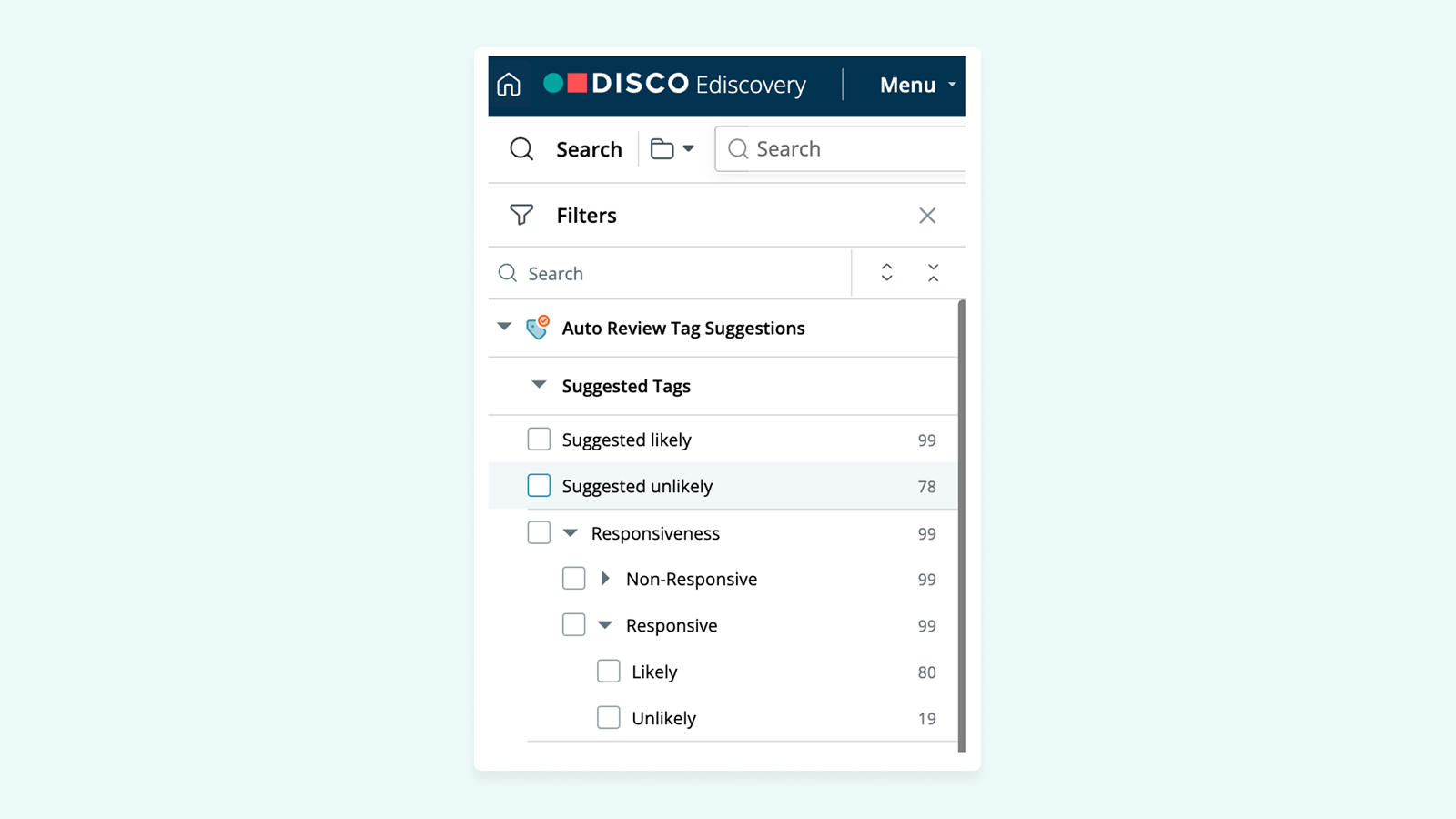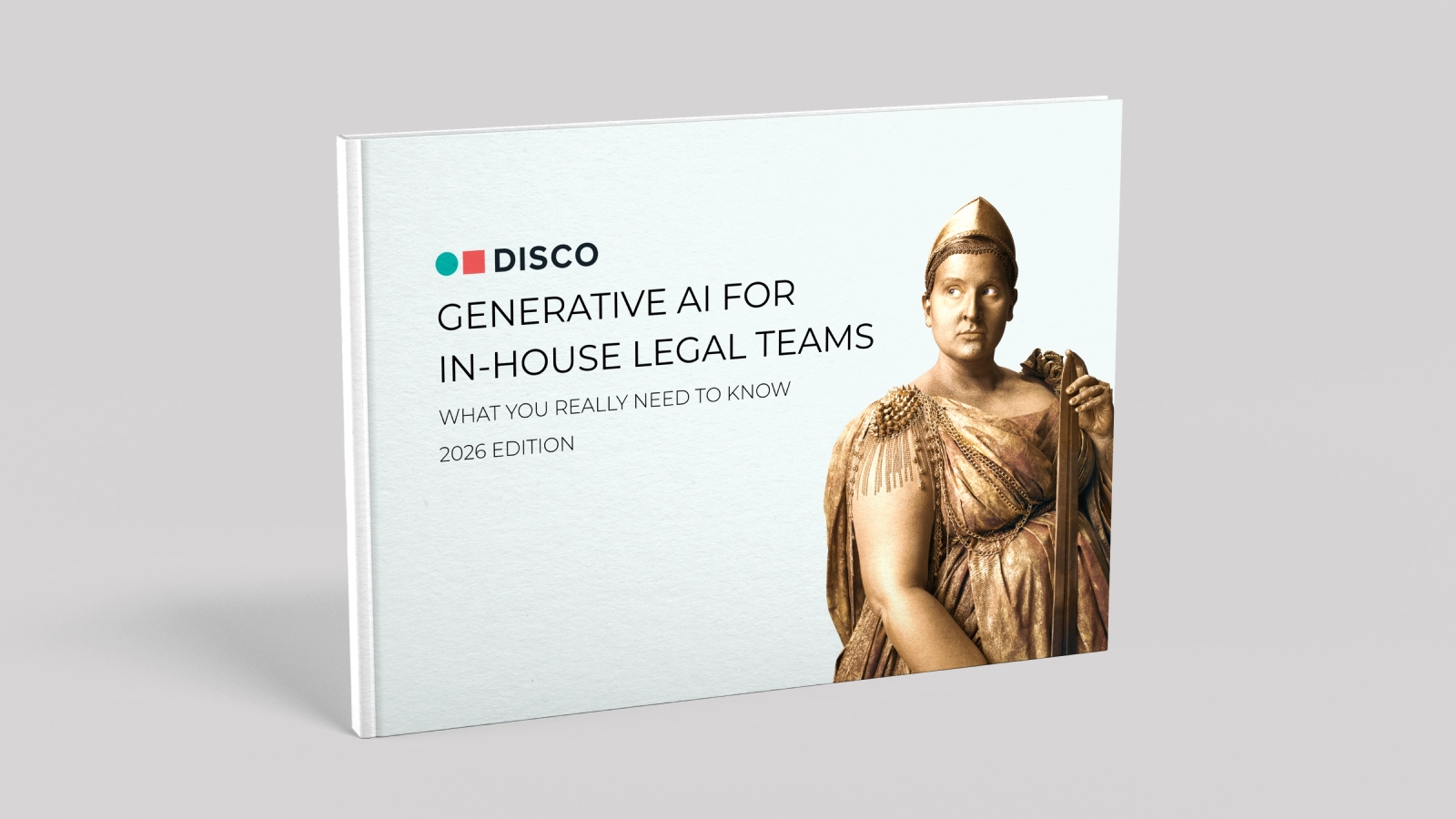⚡️ 1-Minute DISCO Download
You wouldn’t think twice about asking your technology vendors to explain their most costly processes, so why do you hesitate to ask outside counsel?
Discovery — the single biggest expense in a case — is often ignored when making outside counsel hiring decisions. Just as important as legal acumen and subject-matter expertise, how your outside counsel approaches discovery is vital to keeping costs justifiable while setting your case up for success.
How can you get the information necessary to make an informed decision on who should handle your case? At the very least get the answers to these six questions:
1. Who is the discovery team on my case?
Assuming attorneys are well-versed in ediscovery leads to bloated bills and an unnecessarily complicated process.
Experienced discovery counsel will be able to demonstrate concrete ways in which they’ve created efficiency, financial savings, or impacted case outcomes. If an outside legal team does not have much experience with data-intensive cases, ensure an advisor is included in key parts of the discovery process — especially strategizing regarding the scope of discovery propounded on opposing counsel, negotiating any discovery agreements with opposing counsel, and document review.
Here are some questions to consider:
- Who is the day-to-day discovery team?
- Is the experienced counsel a senior partner who is only minimally involved day-to-day? How beneficial is it to have them on the team, then?
- Who is the main point of contact?
- Is there certain correspondence an associate might write as opposed to the partner in charge?
Understanding the division of labor for strategy, execution, correspondence, and reporting gives you the opportunity to demand more engagement from the senior team members (if that’s desired) or conversely to insist that certain work be done by a more junior attorney (at their correspondingly lower billable rate) in consultation with the senior members of the team.
Finally, law firms should encourage junior attorneys to take an active role in managing cases and working directly with corporate counsel — this shows a desire to build a relationship for the long haul. However, outside counsel should articulate the plans in place if problems arise or additional support is required. This does not demonstrate a lack of support for their junior attorneys, but shows how senior leadership is taking an active role in both mentorship and client relationships.
2. What is your discovery process?
Asking outside counsel how they handle the discovery process should prompt responses on how they address planning for discovery, negotiations with other parties, and knowledge management. Outside counsel that doesn’t have a process is someone who is going to make it up as they go along, unnecessarily costing you time, money, and strategic advantage.
Strategic planning is often overlooked. Experienced counsel should be able to discuss issues such as how where the case is venued will impact discovery, the process for aligning discovery with legal elements of your causes of action of affirmative defenses, what mechanisms they’ll use to get this key evidence, and the key individuals whose data will need to be collected (from your employees as well as opposing and third parties).
Outside counsel should also be able to discuss their general approach to pre-discovery negotiations, protective orders, and ESI agreements readily and with ease. This should include examples of how they’ve successfully negotiated ESI agreements or utilized the pre-discovery negotiation process to aid their corporate clients.
Lastly, getting data is only useful if outside counsel can utilize it to move the case forward. Not every member of the team can (or should) review documents or attend every deposition. How does your outside counsel relay key information to their entire team (and to your team) in an effective manner?
For example, how does the firm handle depositions? Utilizing deposition summaries or siloed, redundant review on hard copies are not only ineffective at transmitting key information (like tone, affect, and credibility), but such review means thoughts cannot be shared and available to the whole case team.
(A deposition management tool like DISCO Case Builder enables teams to collaboratively review and tag relevant portions of depositions and create an export of the key information in the deponent’s exact language, synched to the video for context. In doing so, teams can quickly and easily get up to speed on key witnesses without needing to duplicate work.)
3. How will you work with my organization?
Discovery does not happen in a vacuum. Outside counsel should have a plan to work with your organization over the life of a case. While detailed answers for your specific matter may not be readily available, they should be able to speak to prior cases.
Pre-collection:
- How much access to your team does outside counsel anticipate needing, for everything from interviews through collection?
- What level of involvement do they anticipate from your IT resources?
- How will your team be involved in the process?
Post-collection:
- How will outside counsel communicate with your team and who with?
- What is their typical level of engagement with in-house counsel/subject-matter experts (SMEs) on similar or recent cases?
Throughout the case:
- What are they going to communicate to you, how, and at what cadence?
- Is formal correspondence the only way case strategy will be discussed or planned?
- Will outside counsel want/need your formal approval of the proposed plan of action, or will silence be taken as acceptance?
For any — or all — of this correspondence, will you have to request such information?
One reason to consider a centralized ediscovery platform that grants outside counsel user rights to is the ability to get insight on your own time. For example, when using DISCO and without contacting outside counsel, organization managers at corporations can see review pace, individual reviewer metrics, estimated completion dates, and the breakdown of findings in all cases where outside counsel use review stages as part of the review process.
4. What legal technology do you use?
If implementing technology to increase the efficiency of legal services exists but a lawyer refuses to use such technology, they’re overbilling you. This could be why the ABA and 37 states developed a duty of technology competence for attorneys.
What technology does your firm use and is your staff trained on best practices?
Why should you pay for anyone to spend any time adding “Response to Request for Production X” to a document when a template could insert the relevant text in seconds?
Whether technological efficiencies exist is not the end of the discussion. Legal teams require training on what efficiencies exist and how to use the technology properly, not to mention a culture that embraces their use of such technology.
For example, does the potential law firm manually track exhibits? When platforms like DISCO provide the ability to create exhibit lists that are fully editable and updates numbering automatically, you’re paying for unnecessary effort.
What factors impacted your decision to select this technology?
Requiring outside counsel to explain why they chose a particular technology (even if you’re already familiar with the program) reveals the functionality they think is important and the efficiencies they are willing to accept. For example, if a firm has purchased a platform that provides email threading, but they fail to mention how they use that tool, it’s clear they don’t think that’s a valuable piece of the platform they’ve purchased.
5. How do you ensure that discovery is cost-effective?
Just like the treadmill gathering dust in the garage doesn’t make you ready for a marathon, outside counsel only saves you money if technology is implemented strategically.
How do you predict ediscovery costs and keep them low?
Predictability is vital to budgeting for litigation costs. To plan and make decisions you need to know what those costs are going to be and when those costs will be incurred. You need to ask if there are fluctuations in costs: Will there be a big bill upfront for processing, additional fees for adding users, expanded data, etc? Similarly, you need to understand how you’ll be billed. Will you get an invoice from the vendor or outside counsel, quarterly or monthly? To ensure you’re getting all-inclusive pricing that is fair, predictable, and steady, you may want to consider directly contacting such platforms and require outside counsel to use the platform on your cases.
More holistically, how does the manner in which outside counsel typically engages in discovery make the process cost efficient? For example, is counsel consistently using an AI workflow to increase efficiency? Do they offer a guaranteed flat rate for document review? For most outside counsel that answer is no — even though there are solutions on the market that would make it possible.
Does counsel’s implementation of legal technology actually save money or time?
Achieving efficiency through the use of technology is admirable, but how do you know you’re actually obtaining savings? Counsel experienced in discovery and legal technology should be comfortable talking about efficiency gains and cost savings in prior cases and how they can see achieving similar results in your cases.
Saving time and money is not just about outside counsel’s action, but also how outside counsel is willing to use legal technology to work collaboratively with your team. Working collaboratively allows in-house teams to answer questions and coordinate with SMEs without delay. No more wasting time and money on outside counsel figuring out what acronyms stand for or why Bob Smith is talking about a widget, for example, when they can simply send an in-application question to the relevant SME.
What have you learned?
Does outside counsel perform post-mortems on cases to analyze how and where a corporation can reduce the time and cost necessary to complete discovery? Can they provide strategies that could help reduce costs in future cases?
Outside counsel who look at the programmatic areas that could benefit a corporation are the kind of partnerships that you want to cultivate. Such analytical forward-thinking shows the desire to work strategically with you and your team and a desire to help you improve your business.
6. How are you using AI to gain efficiencies in ediscovery?
AI is not an easy button and cannot magically generate amazing time and cost savings in the absence of knowledgeable human guidance. Nor is it a glorious machine that can make up for bad data inputs, poor workflow management, or inept review. How — and to be perfectly honest, if — potential outside counsel currently utilize AI, their comfort and experience working with AI workflows, and their understanding of how to use such workflows to drive efficient, quality reviews are all critical questions you want to explore.
In addition to describing their use of AI, experienced ediscovery counsel should be able to talk about the average time and cost saved by implementing AI in the past.
Lastly — you need to discuss how (or if) outside counsel integrates AI into ediscovery negotiations to ensure opposing counsel’s acceptance and buy-in on the process. This not only shows a facility with ediscovery but a recognition that early action by your outside counsel can prevent costly motions to compel down the road.
Related: How Artificial Intelligence Transforms Ediscovery 💡
By investigating outside counsel’s process and familiarity with developing and executing discovery plans, as well as how they’ve worked for prior clients, corporate legal teams ensure they’re getting experienced counsel able to manage the most unpredictable and costly part of any case. Though even the best-laid plans often go awry, talking through these issues means decisions surrounding discovery are thought out and it is easy to understand how new information or surprise issues fit into the overall discovery program.
Keep discovery costs down with DISCO
Looking for an ediscovery solution with transparent pricing? DISCO's got you covered.
DISCO’s category-leading ediscovery platform is easier than ever to use, with intuitive search, sophisticated ingest and overlay tools, and airtight security. And now, our generative AI solution, Cecilia AI, saves you even more time and money. Learn aboutCecilia Q&A (your in-platform AI fact expert that can answer any question about your case documents), Cecilia Timelines (auto-generate legal timelines that summarize key facts), and Cecilia Auto Review – plus, more developments to come.
See how we can transform your work: Request a demo.


.webp)



%20(1).jpeg)








